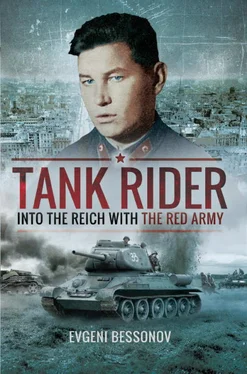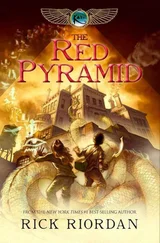In March and April we did intensive training, preparing the men for the coming battles. We knew that it would be the last battle, the last operation for the ultimate destruction of Nazi troops, and then peace would finally come. We did not know when exactly the all-out offensive would start, but some time around April 12 we left Ober and concentrated for the offensive closer to the front line, in a waiting area. We marched on foot to the waiting area. Normally we would only march at night, and in daytime all traffic died out. The enemy must not know where the main strike would come. All the personal equipment that we had in the company, we gave to the deputy battalion commander for logistics, Zaitsev, who had a small support unit – cooks with a kitchen, several soldiers, supply trucks, drivers and so on. We could not just leave it all for someone else!
We did not do any training in the waiting area, and we were given time for rest. Most of the time we slept; many officers played cards, the simple ‘score’ game. I was extremely unlucky in cards, and since that time I have never played cards for money. We followed camouflage procedures, as it was strictly required, and this is why the soldiers did not hang around the forest. It was quiet. During the night from 15 to 16 April we moved from the waiting area (some 3 to 5 kilometres from the front line) to the jump-off area, just 1 or 1.5 kilometres from the enemy. Tanks had already been distributed between the platoons and we were just waiting for the signal to start the offensive.
Many books have been written about this operation – the encirclement and especially the assault of Berlin – both fiction and in memoirs. I will try to describe the battle through the eyes of a junior officer, platoon leader and company commander, who was personally in action together with tank riders and tanks of the 56th Tank Regiment of our Corps. I assaulted the enemy together with my men, and I knew what it cost us to drive the enemy out from his positions.
THE BERLIN–PRAGUE OPERATION

Map to show the advance on Berlin, April 1945.
The artillery barrage opened early on the morning of 16 April, 1945. Then bombers and ground attack planes delivered strong strikes on the enemy’s defences. After the infantry units had broken through, it was our Tank Army’s turn to go into battle. Tanks with tank riders had already lined up in a column on a road that ran along the edge of a wood. For some reason a heavy silence hung in the air; we could not see the enemy and it was a bit scary. It is always hard to get used again to combat operations conditions after a break, especially given the fact that many of the soldiers had not been in action before and did not feel confident. That is why there was some chaos: when we started to mount our tanks after the battalion commander’s order, the Germans opened artillery fire on us. It was extremely unexpected, and the barrage was short, but concentrated and ‘juicy’. We were all gone from the tanks in a twinkle of an eye, and our entire battalion ran into the wood. However, after we had covered some 100 metres, we stopped and came back to our senses, especially now that the barrage had ceased. We ran back to the tanks. It was silent again. The only casualty in our company was the Senior Lieutenant, Grigori Vyunov, who was wounded in the head. He was quickly sent to a hospital and I never saw him again and did not hear anything about him. The battalion commander ordered me to take over the company. We quickly debriefed the situation, received our portion of obscene curses, calmed down and received an order not to leave the tanks. After some time our column moved forward, to the west. Again I was the only officer remaining in the company – Shakulo was wounded again and was hanging around the administrative platoon of the battalion, Guschenkov was apparently also in hospital, while Grigori Mikheev stayed with the damaged tanks. But I was once more unlucky with promotion; several days later Senior Lieutenant Chernyshov came back from hospital. He came running into my shelter during a fastpaced battle for a village and told me that following the battalion commander’s decision he had been appointed company commander.
We were conducting the offensive in difficult forest terrain that abounded with rivers, channels and swampy areas. We had to stick to the roads, which crippled our manoeuvres. The enemy put up stubborn resistance, bullets often ricocheted like rain from the armour of our tanks. We could not abandon tanks on the move, and only by a miracle were we without fatalities. The enemy’s air force bombed the battalion’s column, acting especially boldly in the absence of our fighter aircraft. I have already written that they very rarely covered us.
The roads were covered with mines, blocked with barricades and heaps of rubbish, especially in built up areas and in front of them, as well as under railway and road bridges, which had high embankments. They used Panzerfausts against our tanks. Battles raged during day and night without any break and this was seriously exhausting.
The Germans were afraid of us Russian soldiers. Sometimes we saw unfinished hot meals in houses, cattle was abandoned in barns. There were cases when entire families – two or three persons – would commit suicide and hang themselves, afraid of Russian revenge. Most of the villages that we captured were empty; we swept through some of them without combat, as the Germans had quickly abandoned them, but sometimes they would leave Panzerfaust teams behind to destroy our tanks. I prohibited my soldiers from eating the food that was left on the tables, as I was afraid that it had been poisoned. Whenever possible, we cooked our food ourselves – there was enough food left in German houses, or we ate pickled and preserved food that we found in cellars – one could find a lot of food there. In general, we didn’t starve. We were quite cautious with wine, vodka and other spirits; for a joke we first asked Alexander Guschenkov to drink it, and when we saw that he was all right, we would drink it too. My orderly Drozd always had alcohol in his canteen instead of water – I tried to prevent him many times, but it was useless. Both Petr Shakulo and I were not big fans of alcohol, and generally there were few hard drinkers in the battalion, but there were some – Alexander Guschenkov, Yuri Grigoriev and Grigori Shtokolov.
Alexander Guschenkov was a good comrade of mine, he was almost ten years older than me. He did not have a better attitude than anyone else, but he always shared all things he had with me and never forgot about me. He was just the right type of comrade. It was he who hoped I would be lightly wounded – to stay for some time in a hospital on a bed with white linen, not in trenches on the ground next to the fire.
Despite the German resistance, our battalion’s and the Brigade’s advance was successful. The newcomers fought well, although their training had been short. I did not have anything to complain about. Pre-empting the events that followed, I note that from 16 to 25 April, 1945, we advanced some 450 kilometres through Germany in nine days. The Germans definitely had fewer tanks – they must have lost them in previous heated battles against our troops. However, their shortage of tanks was to some extent compensated for by Panzerfausts and assault guns – the self-propelled artillery pieces with weak armour. However, the enemy’s air force was active, and it remained so for some time and we were hit hard many times.
On 18 April my platoon, three tanks and Lieutenant Fedor Popov with his machine-gun platoon were in the Brigade’s vanguard and were crossing the Spree river in a narrow and shallow place. The other shore was very steep and the tanks stopped at the shore, unable to drive further. I walked up the steep bank with my soldiers and walked forward a bit, but we were pinned down by intensive machine-gun fire from Fritzes. All of a sudden I heard a rude commanding voice from a ditch or a trench: ‘Lieutenant, why the hell are you lying here, go forward, get the men to assault!’ I looked and saw that it was Colonel Koretski – at that time he was commander of the 6th Mechanized Corps. How on earth did he end up in front of our troops? He must have just got lost. Apparently, I was more scared of Vasily Ignatievich Koretski than the Germans – I jumped up like crazy and literally threw myself forward with a cry ‘Get up, follow me, assault, forward!’ The platoon’s soldiers opened fire; all stood up like one and assaulted the enemy.
Читать дальше














